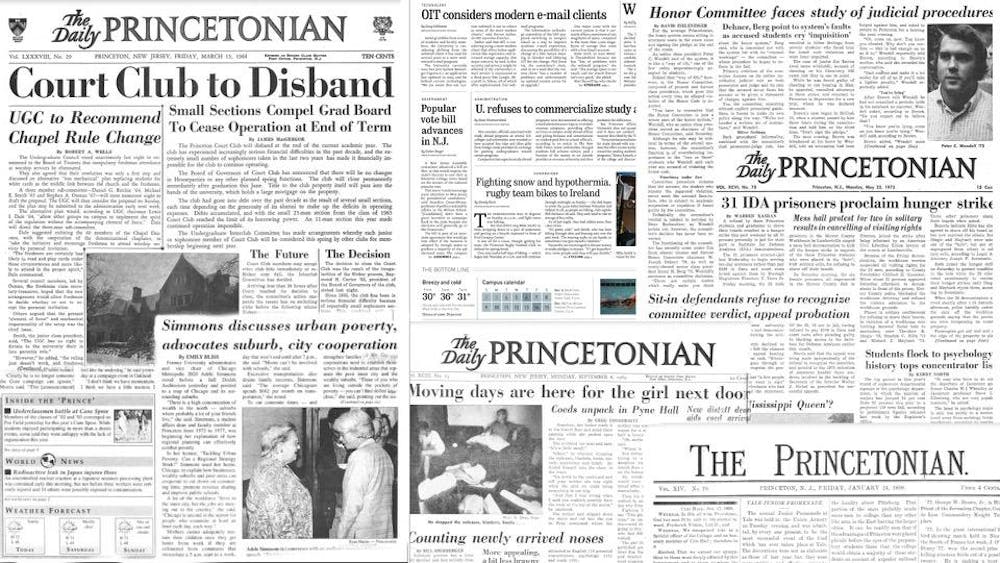Editor's Note: The Daily Princetonian is introducing “This Week in History.” This section will highlight an article from the ‘Prince’s archives that brings to light shocking, exciting, or interesting topics from this week in history. Going forward, “This Week in History” will be an exclusive feature of the ‘Prince’s print edition.
While the ‘Prince’ is committed to acknowledging its full history, the views expressed in the 1924 piece do not reflect the values and standards of the ’Prince’ today.
Exactly a century ago on Jan. 30, 1924, a writer anonymously and virulently denounced Bicker in the “Campus Comment,” a since-discontinued section of The Daily Princetonian. He opened his piece, writing, “The first of January is past, mid-years are not very far away, and after them will come around again in all its pristine ugliness, the most amazing, the most uncalled-for, the most undignified, the most degrading, the most immoral Bicker Week.”
Since its inception in 1914, Bicker has continued to dominate campus conversation during the final week of January and the ‘Prince’ has extensively covered the process through opinion pieces in its storied history. Since then, as old clubs have closed and new ones have opened, the Bicker process has evolved. In the 1920s, protests to abolish Bicker broke out around campus. And, in 1967, Terrace became the first club to voluntarily abandon Bicker in favor of a sign-in policy. Other clubs followed suit.
Although Bicker used to take place in April, sophomores would begin thinking about the process at the start of spring semester. As seen in the “Campus Comment” just 10 years after bicker began, Princetonians had already begun to form strong viewpoints on the practice.
During the “holy week” of Bicker, our anonymous author characterized sophomores as “not freemen, but slaves,” who are bound to serve their eating club “cults.” Building on his religious allegory, he asked, “Have we not all participated in the rites and mysteries and cults sacred to Bicker Week? Are we not all now members of cults and cliques and groups?”
He went on to provocatively describe the dignity that Bickerees were forced to sacrifice as they were forced to “bow down most humbly before the deity of Social Success and Snobbery; of Fratricide, Ill Will, and Disloyalty” in order to join a tyrannical eating club.
The student was convinced that the only way to repair Princeton’s Bicker culture was by abolishing the practice or reforming it entirely. He complained that the clubs had no substantial plans for improvement, and maintained, “When the reformation of Bicker Week, or even its abolition, becomes a topic well aired and ventilated; when the plans are given wide publicity, then and only then will anything result, and result in good.”

Today, we can recognize that comparing sophomores to enslaved people and characterizing mainstream religions as cults is problematic, to say the least. Yet the anti-bicker sentiment remains alive and well in Princeton. In 2021, an alumnus of Cannon Dial Elm called for the clubs to “Cancel Bicker.”
Since 1914, the University has made strides in their transparency regarding bicker after years of op-ed articles and calls for change by students. Students have worked to make simple information like the annual costs of eating clubs, and eventually sophomore dues, public to the student body, allowing students to make an informed decision about the financial commitment before opting to Bicker and join a club.
It is unclear what type of reform the anonymous 1924 author truly desired or whether he would have been satisfied with Bicker in 2024. Nevertheless, the reformation of Street Week has certainly become a topic “well-aired and ventilated,” especially as the largest Princeton class yet, the Class of ’26, prepares to enter what is expected to be a particularly competitive Bicker season.
Raphaela Gold is a head Archives editor and an associate Features editor at the ‘Prince.’

Kaylee Kasper is a head Archives editor at the ‘Prince.’








